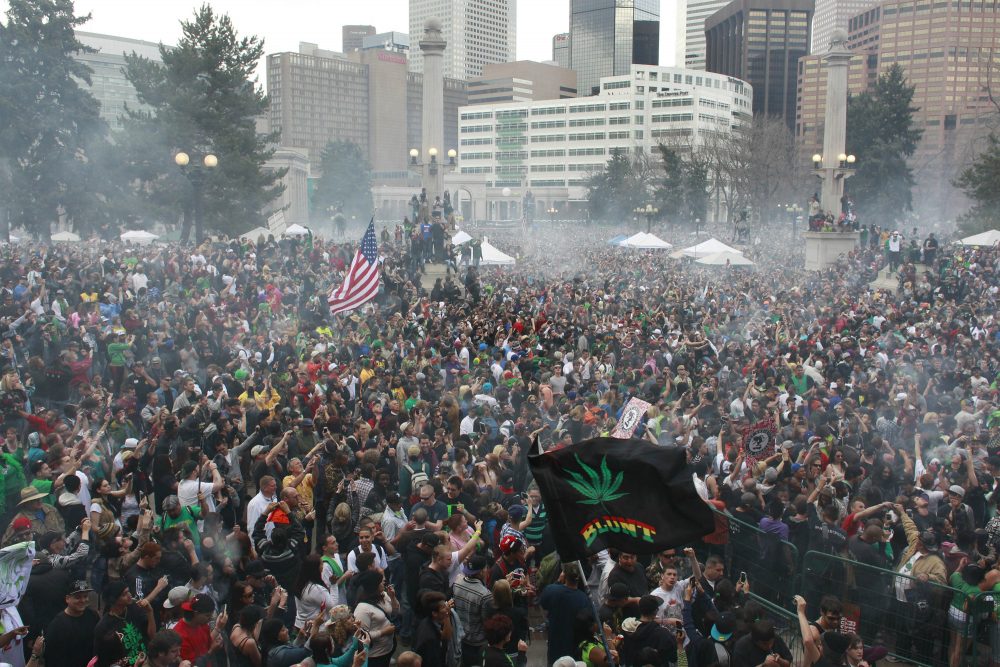Advertisement
Rocky Mountain Highs — And Lows: Cautionary Tales From Colorado About Making Pot Legal In Massachusetts

Whether you wake and bake every morning or never use pot, you will likely be affected by the legalization of marijuana in ways you never desired. The unintended consequences of its legalization in Colorado have been an increase in population, traffic congestion, home prices and homelessness, making it a more expensive, more frustrating, more problematic place to live than it used to be.
Colorado’s 2012 referendum legalizing marijuana was similar to the one being offered in Massachusetts next month. Adults who are 21 and older can legally purchase 28 grams in a single transaction and grow six plants.
Housing prices are increasing fastest in major cities located in states that have legalized marijuana.
Colorado voters overwhelmingly backed the referendum. Then the green rush began. Hordes of dreamers and schemers flooded into Colorado, an average of 85,000 a year, according to the Census Bureau. Some came to grow it, others came to smoke it. They embraced Colorado’s dramatic landscape, where they could catch a Rocky Mountain high by either climbing or consuming.
But now they can’t even get to the mountains without becoming stuck in some massive traffic jam along Interstate 70 or U.S. 285, the main highways leading up from Denver. They can rarely get across town on Interstate 25 without coming to a standstill.
One busy Denver area realtor told me it now takes him one third longer to crisscross the city to show houses. Another realtor described a family who has been camping in their car while they try to find a place to buy. But finding affordable places is tough. The lowest cost tier of houses, those below $400,000, have the steepest bidding wars, according to the realtors.
Housing prices are increasing fastest in major cities located in states that have legalized marijuana. In the past year they rose 9.4 percent in Denver, 11.2 percent in Seattle and In 12.4 percent in Portland, Oregon.
The housing crunch is made even worse by people who rent houses for the sole purpose of illegally growing thousands of marijuana plants. If the houses don’t burn down from dangerous modifications to the electrical systems, they are not properly ventilated and can reek of marijuana or become infested with mold, causing costly headaches for homeowners and their insurance companies.
One Salvation Army shelter surveyed 500 out-of-towners and found as many as 30 percent had come to Colorado for the pot. In July, the organization said it was at its breaking point, with too many to serve with too few resources. It is bracing for 20 percent more homeless this winter.
Advertisement
Fed up with these problems, Pueblo County, Colorado, is voting on whether to ban marijuana businesses next month. If it succeeds, it would join 100 counties in Oregon, where cannabis businesses are prohibited.
Experts have argued over whether or not legalized marijuana would be good for the health of Massachusetts residents. Analysts have examined its effect on the economy. But we haven’t fully anticipated the range of problems that could arise after legalization.
There could be a population rush to Massachusetts similar to the one in Colorado. An average of 13,000 millennials flocked to Denver annually from 2009 to 2014, according to a Brookings Institution report. They were attracted, in part, by a strong, diversified economy, which Boston also offers. Massachusetts features natural attractions equal to Colorado’s. Although the hills are a bit smaller, there’s still skiing in winter, and there is that gloriously long and dazzling coast.
The state-by-state approval process legalizing marijuana has caused dramatic and frequently unwelcome population shifts to places where dope is legal.
State leaders might welcome the new blood, since there has been a net migration away from the state. But higher numbers increase the competition for housing and thus, spike prices. A median priced home in Boston is $505,100, already higher than Denver’s $355,800, according to Zillow.
There is already a lack of affordable housing for young people in Boston and insufficient beds on most nights for the homeless. A population boom could result in even worse delays for commuters.
The state-by-state approval process legalizing marijuana has caused dramatic and frequently unwelcome population shifts to places where dope is legal. Although Massachusetts likes to be way ahead on progressive legislation, with marijuana, it is best to follow the pack. Let other states contend with the frenzied embrace of the new law. Massachusetts can legalize marijuana after the party is over.
Editor's note: Susan E. Reed has lived in Colorado on and off for decades, so it has been easy for her to notice changes over time.

